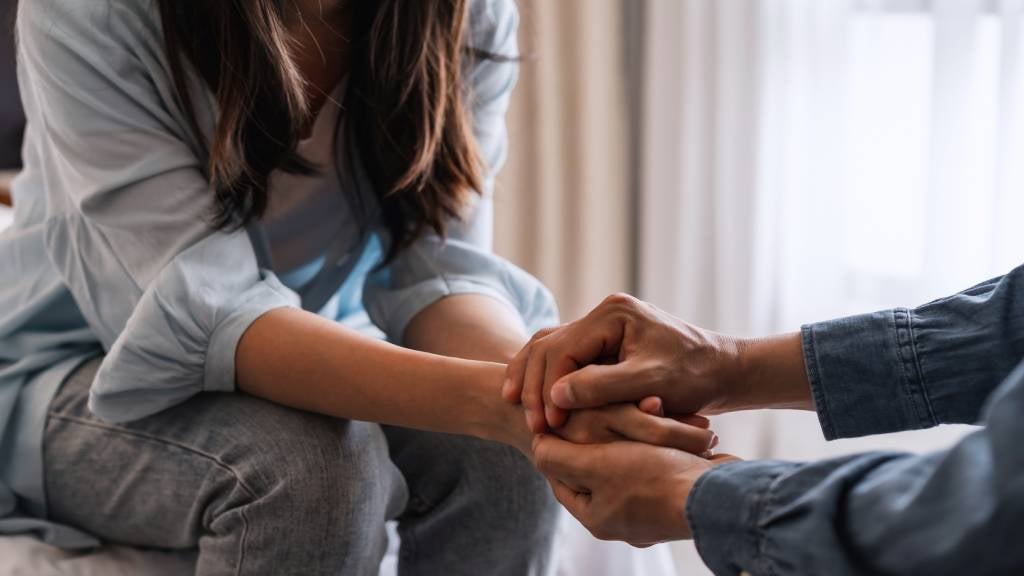Dealing with grief after a sudden loss

Trudie McConnochie interviews Dr Lucy Horne for Real Funeral Insurance.
When it comes to grief, no two experiences are the same. Everyone navigates this emotional roller-coaster differently. That’s especially true when it comes to grief after sudden loss opposed to ‘anticipatory grief’ when someone passes away from a terminal illness.
Dr Lucy Hone – founder of the Coping with Loss program, which supports people through grief – knows this firsthand. She holds a masters degree in resilience psychology and also, sadly, has personal experience of sudden loss, after her 12-year-old daughter Abi died in a car accident in 2014.
“If you’re going through anticipatory grief, you get the [ability] to anticipate this loss, which means that you start grieving earlier,” she says. “But when we lose someone unexpectedly and suddenly, we then have to cope with two different things. One is the grief – so we have to cope with the loss, the reality that they’re not here any longer – and the other is the trauma of it happening overnight.
“What happens with trauma is that it smashes your world apart, and disrupts your deeply held core beliefs of how the world should work, what is likely to happen, the fact that you’re not going to see your loved ones again tomorrow. All of that changes with sudden death, making it additionally challenging to handle.”
Navigating your emotions
You’ve probably heard of the ‘five stages of grief’ model created by psychiatrist Dr Elisabeth Kübler-Ross in the late 1960s: denial, anger, bargaining, depression and acceptance. However, in Dr Hone’s experience, that model isn’t always an adequate picture of grief.
“People can experience so many different emotions,” she says. “We experience grief physically, emotionally, cognitively, spiritually and socially.”
Among the cascade of emotions you might feel – sometimes, all at once – are shock, disbelief, guilt, regret, blame, anger and pain over things that were left unsaid or unfinished. You might lose your appetite, struggle to sleep, feel exhausted and achy, and have trouble concentrating. You could withdraw socially and start questioning your spiritual beliefs.
There can also be frustration over how long the grieving process takes, says Dr Hone.
“As much as we’d like it to be over in a few weeks, months or even a year, grief works at its own pace.”
How to support yourself
One of the most helpful things you can do is stay connected to your loved one after they’ve gone. Dr Hone is a big fan of creating regular actions and rituals to honour your loved one, such as cooking their favourite recipe or listening to music that reminds you of them (more ideas here). And she encourages people to keep talking to their loved one, out loud or in their head, if that feels right for them.
“It’s very healthy to work out ways to forge ongoing connections with loved ones who have passed, so that you keep them present in your everyday life, even though they’re no longer physically here.”
She also recommends reflecting on the meaning they brought to your life.
“I love asking people: What did they teach you? What is their legacy for you? And how will you live differently because you knew them and loved them?” Dr Hone says.
“That’s a really nice practice to actually focus on how they changed you and your life, and what you will do because of them.”
Other tips include:
- support your physical health as best you can
- connect with others who have experienced a similar loss
- accept rather than deny your feelings, even when they’re uncomfortable.
How to support others
If someone you care about has lost someone suddenly, they need your support and understanding. According to Dr Hone, there are four types of support they’ll need:
- emotional support – being a shoulder to cry on
- practical support – helping with things like babysitting and meal preparation
- memory support – talking to the bereaved person about their loved one, to help them keep their memory alive
- information support – for example, coming with them to appointments with lawyers and dealing with the sale of real estate.
For someone grieving, there’s a lot to manage at a time their inner reserves are low, so if you want to support them, Dr Hone recommends assigning the best people in their network to assist in each of the above areas.
Most of all, remember there is no right way to grieve, she says. The worst thing you can say to someone who’s grieving is telling them it’s time to move on.
When to get help
Because grief is so painful and disruptive, it can be difficult to know if what you’re feeling is normal and something you can manage on your own. Dr Hone says if your ability to function on a daily basis is deteriorating over time, instead of slowly improving, it’s worth reaching out to a psychologist or counsellor for support.
“When the grief substantially interferes with your everyday life, then it’s time to get help.”
Need support? Contact Grief Australia or call Griefline on 1300 845 745.
Plan ahead and look to give your loved ones peace of mind with Real Funeral Insurance. Australian residents aged 40-79 are guaranteed acceptance. Find out more.
18 Jun 2023